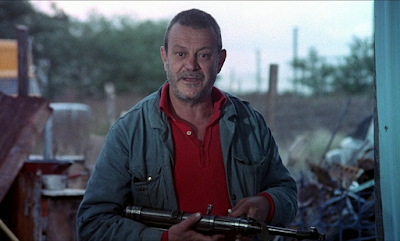Francés | Subs: Castellano/English/Italiano/Portugués/Français (muxed)
112 min | x-264 1192x720 | 6700 kb/s | 448 kb/s AC3 | 23.976 fps
5,61 GB
112 min | x-264 1192x720 | 6700 kb/s | 448 kb/s AC3 | 23.976 fps
5,61 GB
Max y los chatarreros
Amargado por la falta de eficacia de la justicia y por la proliferación
de la delincuencia profesional, el juez Max (Michel Piccoli) abandona su
carrera y se hace detective privado. En una ocasión, para detener a una
peligrosa banda, decide infiltrarse en ella. Así es como conoce a Lily
(Rommy Schneider), una prostituta que es la novia del jefe. Pronto
surgirá entre ellos una irresistible atracción.(FA)
La primera colaboración de Sautet con Claude Néron, Max y los chatarreros
inaugura una asociación muy fructífera, una ósmosis que dará al cine de
Sautet su singularidad. Al igual que había empezado con Classe tout risque o L'Arme à gauche
probando su mano en los thrillers, el director encuentra aquí una trama
ideal antes de embarcarse en tramas más sentimentales, comedias de
costumbres que son fieles reflejos de una época. Mientras que Piccoli y
Romy Schneider se encontrarán regularmente en variaciones de un papel
casi siempre idéntico, los personajes aquí están marcados, entre el
policía oscuro (con un maquillaje pálido, dándole una cara de payaso
triste que a veces es bastante aterradora) y la prostituta manipulada...
Max and the Junkmen
Max et les Ferrailleurs, adapted from a novel by
Claude Néron, was filmed in harsh, grainy color in grubby, workaday locations
in and around Paris. It has the matter-of-fact look and careful pace of a
precinct-house procedural. The film’s central crime is the robbery of a
bank branch by a gang of small-timers, and most of the cops are
beleaguered, cynical bureaucrats. Max is different. A former administrative judge who at
some point in the past traded his gavel for a badge and a gun, he stands
out as a somber and aloof figure among his colleagues. His wide-brimmed
black hat is closer to what a sheriff in a western might wear than to
the standard fedora of the urban lawman, and family money frees him from
the necessity of filing expense reports for the bachelor pad he rents
or the prostitute he pretends to employ as he pursues his big case.
These
are not the perks of ordinary corruption, but rather signs of Max’s
perverse and terrifying zeal. He believes, almost as a philosophical
conviction, that the only real way to solve a crime is to catch the
perpetrator in the act. The problem, of course, is that criminal
behavior, like the rest of human life, is rarely predictable enough to
ensure that outcome. Max’s solution is to manufacture the crime he will
solve. Claude Sautet, who died in 2000,
was an original, tough and subtle dramatist with a gift for
teasing moral complications out of straightforward genre scenarios. (culled from the NYT)








.gif)
No hay comentarios.:
Publicar un comentario